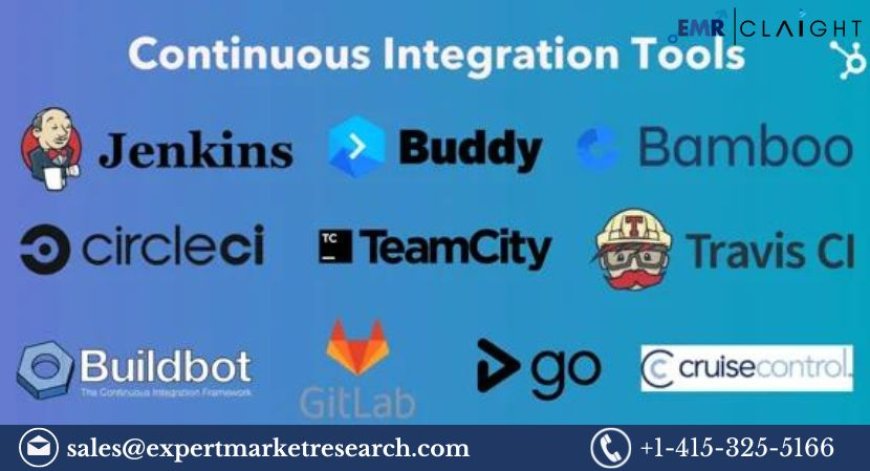Continuous Integration Tools Market Size, Trends & Forecast 2024-2032
In today's fast-paced software development environment, continuous integration (CI) tools have become indispensable. As businesses strive to enhance their operational efficiency and software quality, the adoption of CI tools is rapidly increasing.

In today's fast-paced software development environment, continuous integration (CI) tools have become indispensable. As businesses strive to enhance their operational efficiency and software quality, the adoption of CI tools is rapidly increasing. This blog post delves into the continuous integration tools market, exploring its current size, trends, segmentation, and projected growth, while also offering a competitive analysis and answering frequently asked questions.
Continuous Integration Tools Market Overview
Continuous integration refers to the practice of automating the integration of code changes from multiple contributors into a single software project. It is a crucial part of the DevOps software development methodology, facilitating early detection of problems and improving productivity. The market for CI tools has seen significant growth due to the rising demand for faster delivery cycles and high-quality software outputs.
Continuous Integration Tools Market Size
The continuous integration tools market reached a value of nearly USD 1,186.18 million in 2023. This figure reflects the growing acknowledgment among enterprises of all sizes of the benefits CI tools bring to the software development process, including reduced manual errors, increased team productivity, and faster time to market.
Continuous Integration Tools Market Trends
Shift towards microservices architecture: Many organizations are transitioning from monolithic to microservices architectures, which require robust CI tools to manage increased complexities
Integration with AI and machine learning: AI and ML are being integrated into CI tools to predict potential issues and automate decision-making processes.
Increased adoption of cloud-based solutions: Cloud-based CI tools are becoming popular due to their scalability, flexibility, and lower upfront costs.
Rise of containerization: Technologies like Docker and Kubernetes have led to a surge in containerization, where CI tools play a vital role in managing container lifecycles.
Continuous Integration Tools Market Segmentation
Deployment Mode:
Cloud
On-Premises
Organization Size:
Large Enterprises
Small and Medium-Sized Enterprises
End User:
BFSI (Banking, Financial Services, and Insurance)
Retail and E-Commerce
Telecommunication
Education
Media and Entertainment
Healthcare
Manufacturing
Others
Region:
North America
Europe
Asia Pacific
Latin America
Middle East Africa
Get a Free Sample Report with Table of Contents
Continuous Integration Tools Market Share
The market is currently dominated by several key players, including Jenkins, TeamCity, Travis CI, CircleCI, and GitLab. These platforms offer a range of functionalities that cater to various aspects of continuous integration and have established substantial market share due to their reliability, scalability, and integration capabilities.
Continuous Integration Tools Market Growth
Increasing Adoption of DevOps and Agile Practices: The growing adoption of DevOps and agile methodologies is a major driver of market growth. Organizations are investing in CI tools to enhance collaboration, improve software quality, and accelerate delivery timelines.
Rising Complexity of Software Development: The increasing complexity of software applications necessitates the use of CI tools to manage code changes effectively and ensure seamless integration.
Emphasis on Automation: The growing emphasis on automation in software development is fueling the demand for CI tools. Automation helps reduce manual errors, improve efficiency, and accelerate the development process.
Shift Towards Cloud-based Solutions: The shift towards cloud-based CI tools is driving market growth. Cloud-based solutions offer scalability, flexibility, and cost-effectiveness, making them an attractive option for organizations of all sizes.
Continuous Integration Tools Market Analysis
Increased focus on automation: Businesses are increasingly focusing on automating their development processes to enhance efficiency.
Growing need for rapid software delivery: In the competitive business landscape, the ability to quickly release new software features is a critical advantage.
Enhanced collaboration across teams: CI tools help foster better collaboration among cross-functional teams, leading to more innovative and effective products.
Continuous Integration Tools Market Forecast
The continuous integration tools market is poised for significant growth over the forecast period, with a projected CAGR of 16.6% between 2024 and 2032. Several factors are expected to drive this growth, including the increasing adoption of DevOps and agile practices, the rising complexity of software development, and the growing emphasis on automation.
The shift towards cloud-based CI tools is also expected to contribute to market growth, as organizations seek scalable and cost-effective solutions to support their development processes. Additionally, the integration of CI tools with other development tools and platforms will enhance their functionality and drive adoption among enterprises.
Competitor Analysis
CloudBees, Inc.: CloudBees is a leading player in the CI tools market, known for its enterprise-grade Jenkins-based solutions. The company focuses on providing scalable and secure CI/CD solutions for organizations of all sizes.
Amazon Web Services Inc.: Amazon Web Services (AWS) offers CodePipeline, a continuous integration and delivery service. AWS's robust cloud infrastructure and extensive suite of development tools make it a significant player in the CI market.
Microsoft Corporation: Microsoft's Azure DevOps provides a comprehensive set of tools for CI/CD, supporting seamless integration with Azure cloud services and other development platforms, making it a key player in the market.
Circle Internet Services Inc.: CircleCI is renowned for its cloud-based CI tools that offer scalability and flexibility. The company's strong focus on automation and continuous improvement drives its significant market presence.
GitLab B.V.: GitLab offers a complete DevOps platform with integrated CI/CD capabilities. Its open-source approach and community-driven development make it a major contender in the CI tools market.
Others: Other notable players in the CI tools market include Jenkins, Travis CI, and Bitbucket Pipelines. These vendors continue to innovate and expand their product offerings to capture a larger share of the market.
Read Full Report with Table of Contents
FAQs
Q: What is Continuous Integration (CI)?
A: Continuous Integration (CI) is a software development practice where developers regularly integrate their code changes into a shared repository. This process is automated and typically includes automated testing to detect integration errors early, ensuring that the codebase remains stable and functional.
Q: Why are Continuous Integration tools important?
A: CI tools are crucial because they automate the integration and testing of code changes, improving software quality and speeding up the development process. They help developers detect errors early, reduce manual work, and facilitate collaboration among team members.
Q: What factors are driving the growth of the CI tools market?
A: The growth of the CI tools market is driven by the increasing adoption of DevOps and agile practices, the need for faster software delivery, the rising complexity of software development projects, and the shift towards automation and cloud-based solutions.
Q: How are cloud-based CI tools different from on-premises CI tools?
A: Cloud-based CI tools are hosted on cloud platforms and accessed via the internet, offering scalability, flexibility, and lower upfront costs. On-premises CI tools, on the other hand, are installed and managed within an organization's own infrastructure, providing greater control and customization but requiring significant investment and maintenance.
Q: What are some popular Continuous Integration tools?
A: Some popular CI tools include Jenkins, Bamboo (Atlassian), TeamCity (JetBrains), CircleCI, GitLab, Travis CI, and Bitbucket Pipelines. These tools offer various features and integrations to support different aspects of the software development lifecycle.
Media Contact:
Company Name: Claight Corporation
Contact Person: Emily Jacks, Corporate Sales Specialist – U.S.A.
Email: sales@expertmarketresearch.com
Toll Free Number: +1-415-325-5166 | +44-702-402-5790
Address: 30 North Gould Street, Sheridan, WY 82801, USA
Website:www.expertmarketresearch.com
What's Your Reaction?
 Like
0
Like
0
 Dislike
0
Dislike
0
 Love
0
Love
0
 Funny
0
Funny
0
 Angry
0
Angry
0
 Sad
0
Sad
0
 Wow
0
Wow
0




















































